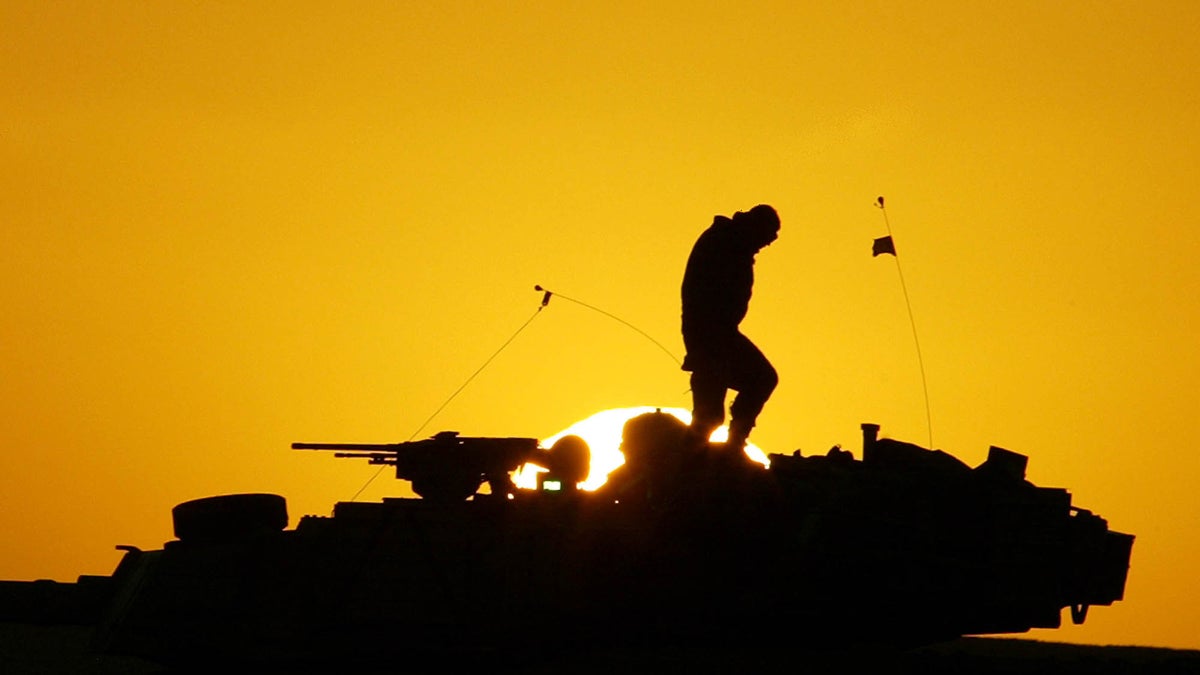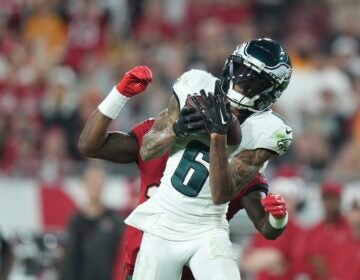‘Yellow Birds,’ called first great novel of Iraq War, is Philly’s pick for ‘One Book’

A U.S. soldier walks atop his armored vehicle at sunset as he prepares for a night military exercise, in the Kuwaiti desert south of the Iraqi border, Sunday, Dec. 22, 2002. (AP Photo/Anja Niedringhaus, file)
Buried on Page 14 of “The Yellow Birds,” author Kevin Powers quietly writes that, before the novel is over, one of his main characters will die. The tragedy is slipped, lethally, in the middle of a paragraph. The surprise has no drama or preamble, the way death often comes in war:
“I have stopped wondering about those inches to the left and right of my head, the three-miles-an-hour difference that would have put us directly over the IED. It never happened. I didn’t die. Murph did. And although I wasn’t there when it happened, the dirty knives that stabbed him were addressed “To whom it may concern.” Nothing made us special. Not living. Not dying.”
“I didn’t want to have this character’s death be a payoff, if that makes sense,” said Powers, who served as a machine gunner in Iraq from early 2004 to early 2005. “It felt wrong to have that be the reward of the narrative. I wanted the attention to be on something else — the challenges all three main characters face, and, particularly, how Murphy gets to the point where he makes the choices he makes.”
When “The Yellow Birds” was released almost exactly a year ago, it immediately attracted attention. Many critics called it the first great novel about the war in Iraq; six months after publication it was selected by East Lansing, Michigan, for its citywide reading program. Now, Philadelphia has followed suit.
The Free Library has selected “The Yellow Birds” for the “One Book, One Philadelphia” initiative. In the spring, an array of panels, events, screenings and discussions — all related to themes in the book — will be coordinated throughout the city.
The book follows three foot soldiers as they try to survive a combat tour in Iraq, and the subsequent transition back home. Powers did not set out to describe how the Iraq war was fought, but rather what it felt like to be there. That feeling, primarily, is bewilderment. After a year in the desert, his characters come away with no understanding of what it means to survive.
Powers started writing at an early age, and earned a poetry fellowship at the University of Texas. During his time in Iraq, he wrote nothing, save a few letters home. He did not start writing “The Yellow Birds,” his first novel, until after he had been home for several years.
The book’s chapters jump in time and place, leaping forward and backward between Al Tafar, Iraq, training at Fort Dix, New Jersey, and recovering in Richmond, Virginia.
Powers said the format of the novel enabled him to bridge the seemingly impossible gap between soldier and civilian.
“Not many people knows what it feels like to get shot at or blown up, but everybody knows what it feels like to be afraid, to be angry, to lose somebody close to you,” said Powers. “I wanted to shift the focus away from particular action and toward the repercussions of that actions — the interior wounds that this soldier and many soldiers face, that people would be able to identify with.”
WHYY is your source for fact-based, in-depth journalism and information. As a nonprofit organization, we rely on financial support from readers like you. Please give today.





